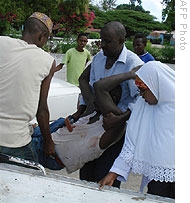VOA标准英语10月-Ethiopian Troops to Relocate Under Somalia Ceasef(在线收听)
Following three days of U.N. sponsored talks in Djibouti, Somalia's transitional federal government made several key concessions to U.N.-led peace efforts, which began in June.
 |
| An Ethiopian soldier in Mogadishu stands in front of a tank and a cache of ammunition, 23 Apr. 2008 |
On Sunday, Somali government officials signed a document that calls for the relocation of Ethiopian troops, starting on November 21st, from the capital Mogadishu and Beletweyn town in Hiran province near the Ethiopian border. A second phase of troop withdrawal is to be completed within 120 days.
The government further agreed to form a 10,000 member joint police force with opposition militia members to maintain security in Mogadishu and other parts of Somalia.
In turn, the opposition faction of the Alliance for the Re-liberation of Somalia, led by Sheik Sharif Sheik Ahmed, said it would observe a ceasefire in Somalia starting November 5th and to stop all hostilities.
A ceasefire agreement was initially signed in Djibouti in June, but the pact was rejected by the hard-line Asmara, Eritrea-based faction of the opposition alliance and by an al-Qaida-linked Islamist group called the Shabab.
 |
| A Somalian is assisted onto a stretcher at the Medina hospital after being injured during clashes in Mogadishu on 16 Oct. 2008 |
Fighters loyal to these groups and others ignored the ceasefire call and have continued their relentless guerrilla war against Ethiopian troops, who intervened in Somalia with U.S. support in late 2006 to oust the Islamic Courts Union from power and to install the interim government.
The Shabab and the hard-line faction of the alliance have refused to recognize the authority of Sheik Sharif Sheik Ahmed to speak on their behalf. Since the signing of the first agreement in June, the Islamist groups have made large territorial gains, and Somalis say they are unlikely to accept a deal that calls for cooperation with the Ethiopia-backed interim government.
Islamist-led insurgents now control the majority of towns in central and southern parts of the country, leaving the government severely weakened and in charge of only a small area of the capital and the northwestern town of Baidoa, where the interim parliament is based.
The situation in Somalia has sparked fierce internal competition among Islamist insurgent groups and disputes between rival clans. U.S.-based Somali observer Michael Weinstein said in recent weeks, Somalia has lacked social cohesion and coherence that is unprecedented since the country descended into factional warfare in 1991.
He said, "There is [a] move toward consolidation. There are moves to separation going on simultaneously. I have never seen anything like this. And it has to do with the power vacuum opening up with the Ethiopian withdrawal. They are continually repositioning themselves, all the factions in Somalia. They are breaking up into the smallest units possible and then recombining in shifting alliances that change from day-to-day. That to me could be a sign, not of further fragmentation, but the beginning of a kind of re-organization."
Ethiopia says it is reluctant to pull out all of its troops from Somalia until a sizeable international security force is in place to protect the government.
An African Union force in Somalia still lacks thousands of troops to secure the country and the United Nations says its peacekeeping force will not be deployed until the security situation in Somalia improves.